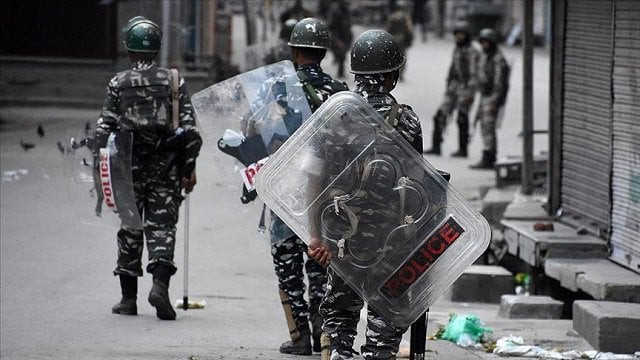Need for stronger Kashmir narrative urged
Speakers at Kashmir conference warn world community must intervene or get ready for worse

PHOTO: Anadolu Agency.
This was urged by speakers during a one-day conference on Kashmir titled “Keeping Kashmir Alive on Global Agenda; Legal and Political Aspects of the Humanitarian Crisis”. The conference had been organised by the Sustainable Development Policy Institute (SDPI) in Islamabad on Thursday.
Federal Minister on Kashmir and Gilgit-Baltistan Affairs Sardar Ali Amin Gandapur said that Kashmir today represents the worst example of human rights violations in the world, where hundreds of thousands of innocent people have been either killed or tortured, thousands of women have been raped by India’s brutal military while thousands of children have been orphaned all the while they live in an open-air prison.
Amin demanded that the world and the international community rise to help implement the United Nations (UN) resolutions on the disputed territory apart from pressuring India to give the people of Kashmir their right of self-determination.
He lamented that residents of the disputed valley have been braving a brutal curfew that has lasted for 130 days now with a million Indian soldiers deployed to keep this open-air prison.
The time has come, he said, for the Kashmiri people to get their freedom and that it was our national duty to support and stand by our Kashmiri brothers and sisters through thick and thin.
Parliamentary Committee for Kashmir Chairman Syed Fakhar Imam, while chairing the session, said that effective diplomacy, politics and a strong economy was the only way forward for Pakistan to build a strong narrative on Kashmir and get the necessary international support to help the Kashmiri brethren.
Recognising Kashmir as a disputed territory and a plebiscite, as laid down in the UN resolutions, are two principal facts which cannot be denied, he said.
He added that the 130-day-siege and communication blackout from Kashmir has changed the narrative of the world and media, especially in the South Asian region in different ways and we need to build on this narrative.
Highlighting the facts, he said that it was the United Kingdom (UK) that laid the foundation of this long-lasting crisis and dispute of the Indian occupied Kashmir (IoK) between India and Pakistan.
If the Muslim Majority district of Gurdaspur was given to Pakistan, which was given to India against the principle of the partition, the conflict between India and Pakistan would have been very different, he lamented.
Leader of the House in Senate Shibli Faraz said that India claims to be a secular country, but after the election of the Bharatiya Janata Party (BJP) led by Narendra Modi and the rise of the RSS ideology, the real fascist face of the Indian regime has been exposed.
Noticing the impasse, he acknowledged the need to adopt new approaches and stressed on the need to be more aggressive in pursuits to tackle the Kashmir humanitarian crisis. He also urged all intellectuals including legal experts, academia, think tanks, and universities to jointly build and highlight the legal case of the Kashmir humanitarian crisis on international fora and find new approaches and narratives to deal with the issue.
SDPI Executive Director Dr Abid Qaiyum Suleri, while highlighting the scale and gravity of the humanitarian crisis in Indian occupied Kashmir (IoK), said that the conflict and the prevailing humanitarian crisis will have dire implications, not just only for the South Asian region but also for the global peace and security.
He stressed the need for urgent measures and actions from the international community to put pressure on India for ensuring normalcy and stop the human rights violations in IoK.
Published in The Express Tribune, December 14th, 2019.



















COMMENTS
Comments are moderated and generally will be posted if they are on-topic and not abusive.
For more information, please see our Comments FAQ